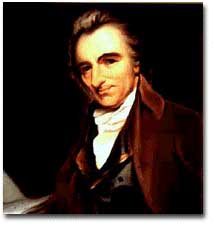10f. Thomas Paine's Common Sense
Americans could not break their ties with Britain easily. Despite all the recent hardships, the majority of colonists since birth were reared to believe that England was to be loved and its monarch revered.
Fear was another factor. Any student of history was familiar with the harsh manner the British employed on Irish rebels. A revolution could bring mob rule, and no one, not even the potential mob, wanted that. Furthermore, despite taxes, times were good. Arguments can be made that average American was more prosperous than the average Briton.
Yet there were the terrible injustices the colonists could not forget. Americans were divided against themselves. Arguments for independence were growing. Thomas Paine would provide the extra push.
Common Sense
Common Sense was an instant best-seller. Published in January 1776 in Philadelphia, nearly 120,000 copies were in circulation by April. Paine's brilliant arguments were straightforward. He argued for two main points: (1) independence from England and (2) the creation of a democratic republic.
Paine avoided flowery prose. He wrote in the language of the people, often quoting the Bible in his arguments. Most people in America had a working knowledge of the Bible, so his arguments rang true. Paine was not religious, but he knew his readers were. King George was "the Pharaoh of England" and "the Royal Brute of Great Britain." He touched a nerve in the American countryside.
A Real Paine for the British
Beside attacks on George III, he called for the establishment of a republic. Even patriot leaders like Thomas Jefferson and John Adams condemned Paine as an extremist on the issue of a post-independence government. Still, Common Sense grew the patriot cause. It made no difference to the readers that Paine was a new arrival to America. Published anonymously, many readers attributed it to John Adams, who denied involvement.
In the end, his prose was common sense. Why should tiny England rule the vastness of a continent? How can colonists expect to gain foreign support while still professing loyalty to the British king? How much longer can Americans stand for the repeated abuses of the Crown? All these questions led many readers to one answer as the summer of 1776 drew near.






